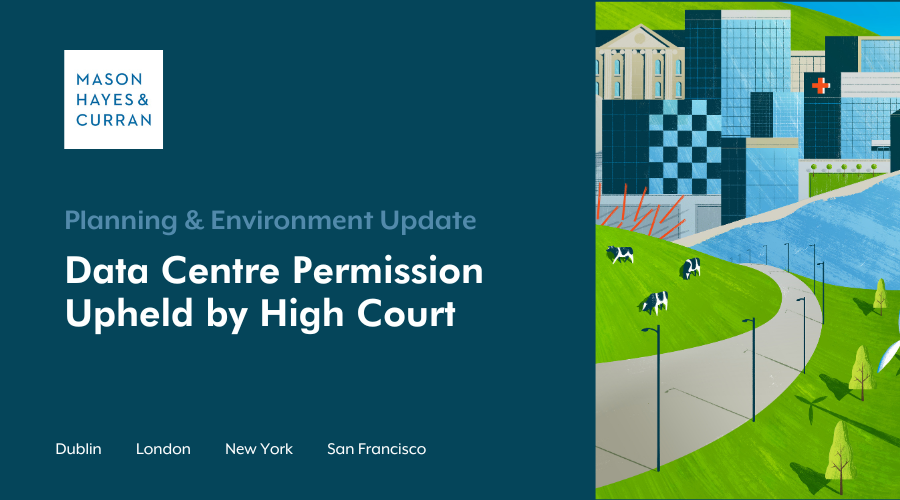Data Centre Permission Upheld by High Court

The High Court recently dismissed two separate judicial review challenges to decisions of An Bord Pleanála (ABP) granting permission for:
- A data centre at Clonee, County Meath nearby the existing Facebook data centre, and
- Associated grid infrastructure and 220kv substation
The applicants relied on various grounds including that:
- ABP was wrong to consider Government policy on climate because the said policy is ineffective
- ABP failed to assess the cumulative environmental effect of greenhouse gas (GHG) emissions, and
- ABP’s decisions amounted to a breach of the applicants’ right to life, bodily integrity and a healthy environment
Background
The developer and notice party, EngineNode, was originally granted permission by Meath County Council to develop the data centre which included an on-site gas-powered energy centre intended to power the data centre. However, in response to several planning appeals, EngineNode indicated to ABP that it is prepared to power the data centre by connecting it to the national grid, instead of the gas-powered energy centre. It then applied to ABP for permission for the grid connection infrastructure under the Strategic Infrastructure Development (SID) process. This included an Environmental Impact Assessment Report (EIAR) which assessed the two developments.
Statutory obligation to ‘have regard to’
The first element of the applicants’ grounds was that ABP failed to have regard to certain policies and statutory provisions relevant to the development and that ABP was incorrect in having regard to other policies which the applicants alleged are failing and are ineffective.
Mr Justice Holland noted that the meaning of “have regard to” can differ depending on the legislative context in which it is set. However, he held that it is generally interpreted in caselaw as being an obligation which generally falls well short of requiring any compliance with or implementation of policies or other matter to which regard must be had.
He also stated that the burden of proof of failure to have regard to something is generally on the applicant in judicial review proceedings. However, owing to the relative ease with which a decision-maker can demonstrate that it has considered a matter, Mr Justice Holland held that the bar for applicants should not be too high because it would be inherently unfair in proceedings involving no oral evidence to require an applicant to prove a negative as to what occurred in the mind of a decision-maker.
Regarding the applicant’s plea that ABP ought not to have had regard to Government policy that is ineffective, Mr Justice Holland held that where submissions state that policies clearly have not been, or will not be, successfully effected, ABP is required to at least examine such submissions. However, despite this obligation, Mr Justice Holland noted that ABP has “no roving commission to interrogate the success or otherwise of the implementation of Government policy relevant to a decision to be made by it”. He considered that this would “impose an excessive and potentially sclerotic burden on the Board”. He concluded that the obligation to consider submissions on the effectiveness of policies is a light one. He added that ABP is generally entitled, unless weighty submissions are made to the contrary, to take it that Government policy will be affected, even if its success may not be complete.
On that basis, he dismissed the applicant’s arguments that ABP should not have had regard to Government policy on climate change which the applicants argued was ineffective. In addition, Mr Justice Holland was satisfied that ABP did have regard to all relevant policies which had been identified in its decisions.
GHG emissions
The second element of this case was the applicants’ argument that ABP failed to identify and assess the environmental effects of GHG emissions from the generation of electricity used to power the data centre.
As the data centre was to be powered by the grid, the GHG emissions referred to were those created by the generation of grid electricity. Mr Justice Holland noted that there are no significant direct GHG emissions from the data centre. He held that the consequential effects of the GHG emissions on global warming and climate change or on specific individuals “are not to be considered as indirect or cumulative effects in EIA as they are remote, elusive, contingent, speculative and incapable of measurement”.
Right to life, bodily integrity and a healthy environment
The final element of this case was the applicants’ argument that ABP’s decisions breached and will continue to breach their right to life, bodily integrity and to a healthy environment. These rights are guaranteed by Article 40.3 of the Constitution and Articles 2 and 8 of the European Convention on Human Rights (ECHR). This was based on the argument that the GHG emissions resulting from the development will significantly contribute to the climate crisis.
While accepting that the Supreme Court has recognised the dangers to human beings posed by climate change, Mr Justice Holland noted that the Supreme Court declined to recognise a justiciable, that being capable of being litigated in a court of law, personal right to a healthy environment. Regarding that the European Court of Human Rights (ECtHR) has vindicated personal environmental rights via Articles 2 and 8, Mr Justice Holland noted that it does not provide relief for general environmental degradation, even where it generally imperils public health, He also held that the ECtHR has required proof of actual and severe harm specific to evidence a claim. He added that the applicants’ reliance on this mode of reasoning amounts to an assertion that they have not merely standing to challenge the decisions, but entitlement to legally prohibit any development which would directly generate GHG emissions of any degree.
Mr Justice Holland noted that Section 3(2) of the European Convention on Human Rights Act 2003 provides for a remedy in damages to a person who has suffered injury, loss or damage as a result of a failure by an organ of the State to perform its functions in a manner compatible with the State's obligations under the ECHR. He held that damages are the only and exclusive remedy available for injury, loss or damage caused by such a failure. Accordingly, he held that he had no power to grant any other form of relief.
Conclusion
In this case, Mr Justice Holland analysed the policies relevant to the data centre and associated grid infrastructure which ABP was obliged “to have regard to”. He concluded that it is Government policy that continuing development of data centres is desirable in itself and this is explicitly cited in national climate policy. He stated that rapid growth in energy demand from data centres is expected.
Regarding the court’s view that the bar for applicants proving that a decision maker has failed to have regard to something should not be too high, it is recommended that decision-makers note, even in the simplest manner such as recitals, that it has considered a matter. This is to provide some evidence that regard has been had to certain matters.
Developers should also note that, regarding carrying out an EIA, the court considered the EU’s ‘Guidance on integrating climate change and biodiversity into environmental impact assessment (2013)’. This provides that the impact of a project on climate and climate change should be considered in EIA. Mr Justice Holland considered that “it is no error to acknowledge and assess uncertainty and risk as best you reasonably can. Error may well lie in ignoring them”. Accordingly, it is recommended that if there is any uncertainty as to the likely effects of a proposed development on the climate or climate change, this uncertainty should be addressed in the Environmental Impact Assessment Report (EIA). If it is not addressed in the EIAR and permission is granted regardless, the permission could be at risk of being quashed on appeal or by way of judicial review.
For more information on planning permissions for data centres , please contact a member of our Planning & Environment team.
The content of this article is provided for information purposes only and does not constitute legal or other advice.
Share this:




